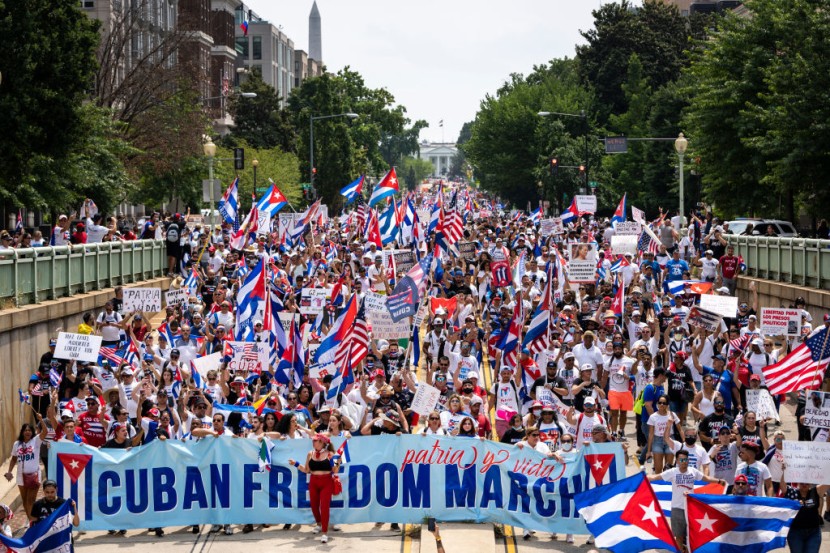
The Biden administration imposed further sanctions on Havana on Monday, joining a group of 20 other democracies in condemning the Cuban regime's recent assault on protesters, but critics and anti-communist groups think the US actions are insufficient.
They claim that President Joe Biden is squandering a historic opportunity to support a big pro-freedom movement on the communist-controlled island and that a few more sanctions on a country that has been subject to a 60-year US embargo would make little difference.
Protesters demand an end to Cuba's communist regime
A wave of pro-democracy protesters gathered on the Cuban Embassy in Washington, DC, on Monday afternoon to demand an end to the communist regime that has kept the island country isolated from the US for the last 62 years. Wrapped in Cuban flags, waving banners, and asking for freedom and liberty, the crowd yelled outside the embassy gates on 16th Street, only a few blocks away from the White House.
After weeks of unrest in Cuba against the communist regime over food shortages, a faltering economy, and a rise in COVID-19 cases, the demonstration in Washington took place. President Biden has been chastised for not doing enough to press for change in Cuba, which he recently described as a "failed state," as per Fox News.
Thousands of anti-Cuban government protesters gathered outside the White House and stayed overnight to push Joe Biden to do more to confront socialist Miguel Dáz-Canel's actions against the Cuban people.
Per Daily Mail, the group stayed late to prepare for a scheduled midnight candlelight vigil to commemorate the 26th of July Movement, a Cuban national holiday honoring Fidel Castro's first attempt to topple then-Cuban tyrant Fulgencio Batista in 1953.
On Sunday night, Republican Representative Maria Elvira Salazar of Miami attended the candle and cellphone light vigil. On Monday, more elected officials are likely to join the protests. More people came to DC early Monday morning and went straight to the White House to join the protest.
Thousands of more protestors are expected to arrive in the nation's capital on Monday, according to Maria Fundora, the head of Cuba Libre, a Texas-based organization that assists Cubans seeking refuge. The demonstrations come as Cuban-Americans claim Biden isn't doing enough to push back against the island's socialist regime, which has retaliated violently against demonstrators who marched in the streets earlier this month amid food, vaccine, and medicine shortages caused by the pandemic.
Hundreds of protestors, activists, and journalists were detained by Cuban authorities when protests erupted across the nation on July 11 amid an economic crisis, a scarcity of necessities, and a lack of liberties - all centered on the Covid-19 crisis.
Mexican president urged Biden to make a decision on Cuba's unrest
Meanwhile, Mexican President Andres Manuel Lopez Obrador stated on Monday that he believes US President Joe Biden needs to decide on the embargo against Cuba, which is experiencing its worst turmoil in decades. Given that "nearly all nations of the world" are against the embargo, Lopez Obrador said it was time to make a concrete decision about it, rather than waiting for countries to vote to abolish it through the UN General Assembly.
Lopez Obrador also stated that Cuban households should encounter fewer limitations when it comes to receiving remittances from relatives in the United States or elsewhere. Remittances to Cuba are estimated to be worth between $2 billion and $3 billion per year, making them the country's third-largest source of revenue behind the services industry and tourism.
The transactions have been hindered by measures implemented under former US President Donald Trump, including the closure of Western Union's Cuban operations. The Cuban government has blamed the demonstrations mostly on "counter-revolutionaries" funded by the United States who are taking advantage of the economic difficulties imposed by the US embargo, which has been in place for decades, Reuters via MSN reported.
Related Article : Joe Biden Expresses Support to Cuba Protesters; Sen. Rubio Criticizes The Administration's Initial Assessment








